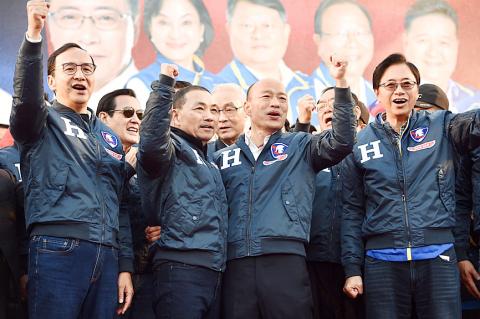Kaohsiung Mayor Han Kuo-yu (韓國瑜) yesterday said that Southeast Asian nations are “no longer taking Taiwan seriously” due to its diplomatic challenges and poor economy, and urged voters to support the Chinese Nationalist Party (KMT) to prevent the nation’s “downfall.”
Commenting on a Thai visa rule change that requires Taiwanese applicants to provide a financial statement, the KMT presidential candidate said the move suggests that Taiwan is losing status in the eyes of other countries.
The Thailand Trade and Economic Office in Taipei in a statement on Monday last week said that the new rule also applies to British, Chinese and French passport holders, and would be extended to more nations.

Photo: Peter Lo, Taipei Times
“They look down on us,” Han said at a rally in Taipei. “Southeast Asian countries are no longer taking Taiwan seriously because of its poor economic performance, diplomatic difficulties and domestic problems.”
Although the Thai government has since postponed the implementation of the rule, it should be taken as a sign that Taiwan is “quickly going downhill,” Han said.
The Jan. 11 elections present a life-or-death choice for the Republic of China, he said, adding that the nation would face four years of “misery” if President Tsai Ing-wen (蔡英文) of the Democratic Progressive Party is re-elected.
At a separate rally in Taipei, Han reiterated that neighboring nations no longer consider Taiwan as deserving of their attention.
With the Economic Cooperation Framework Agreement (ECFA) expected to expire next year and Taiwan’s entry into the Regional Comprehensive Economic Partnership (RCEP) seeming unlikely, the nation’s future is shrouded in uncertainty, he said.
His wife, Lee Chia-fen (李佳芬), has met with their overseas supporters in Malaysia and Indonesia who told her “in tears” that they were saddened to see Taiwan decline, Han said.
“The world is forgetting Taiwan and Taiwan is forgetting the world,” he said.
Taiwanese TV channels do not broadcast world news, only political talk shows, as they are cheaper to produce and commentators “simply say what they want based on their political leaning,” Han said.
If elected, he would promote English-language education at elementary schools and launch a program to send university students abroad for a year using government funds.
While the program is estimated to cost NT$40 billion to NT$50 billion (US$1.3 billion to US$1.6 billion), Han said he expects the actual cost to be lower, because “entrepreneurs could be deeply moved by the policy and donate” to it.
He would also provide scholarships for 1 percent, or about 3,500, of government employees to study abroad.
The policy would include military personnel, public-school teachers, police, firefighters and public servants aged 45 or younger, Han said, adding that if the program is successful, the quota would be doubled the following year.
“This plan would guarantee that Taiwan becomes completely different in 10 years,” he said, adding that he aims to improve the nation’s economy and “revive its lost glory.”

The CIA has a message for Chinese government officials worried about their place in Chinese President Xi Jinping’s (習近平) government: Come work with us. The agency released two Mandarin-language videos on social media on Thursday inviting disgruntled officials to contact the CIA. The recruitment videos posted on YouTube and X racked up more than 5 million views combined in their first day. The outreach comes as CIA Director John Ratcliffe has vowed to boost the agency’s use of intelligence from human sources and its focus on China, which has recently targeted US officials with its own espionage operations. The videos are “aimed at

STEADFAST FRIEND: The bills encourage increased Taiwan-US engagement and address China’s distortion of UN Resolution 2758 to isolate Taiwan internationally The Presidential Office yesterday thanked the US House of Representatives for unanimously passing two Taiwan-related bills highlighting its solid support for Taiwan’s democracy and global participation, and for deepening bilateral relations. One of the bills, the Taiwan Assurance Implementation Act, requires the US Department of State to periodically review its guidelines for engagement with Taiwan, and report to the US Congress on the guidelines and plans to lift self-imposed limitations on US-Taiwan engagement. The other bill is the Taiwan International Solidarity Act, which clarifies that UN Resolution 2758 does not address the issue of the representation of Taiwan or its people in

US Indo-Pacific Commander Admiral Samuel Paparo on Friday expressed concern over the rate at which China is diversifying its military exercises, the Financial Times (FT) reported on Saturday. “The rates of change on the depth and breadth of their exercises is the one non-linear effect that I’ve seen in the last year that wakes me up at night or keeps me up at night,” Paparo was quoted by FT as saying while attending the annual Sedona Forum at the McCain Institute in Arizona. Paparo also expressed concern over the speed with which China was expanding its military. While the US

SHIFT: Taiwan’s better-than-expected first-quarter GDP and signs of weakness in the US have driven global capital back to emerging markets, the central bank head said The central bank yesterday blamed market speculation for the steep rise in the local currency, and urged exporters and financial institutions to stay calm and stop panic sell-offs to avoid hurting their own profitability. The nation’s top monetary policymaker said that it would step in, if necessary, to maintain order and stability in the foreign exchange market. The remarks came as the NT dollar yesterday closed up NT$0.919 to NT$30.145 against the US dollar in Taipei trading, after rising as high as NT$29.59 in intraday trading. The local currency has surged 5.85 percent against the greenback over the past two sessions, central